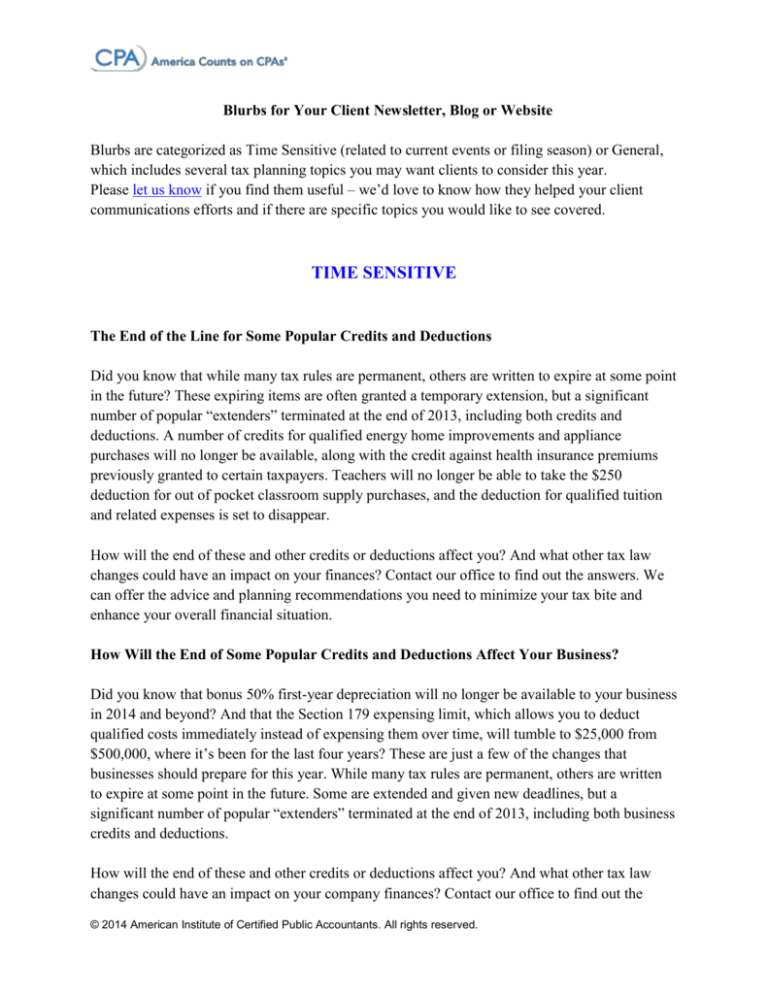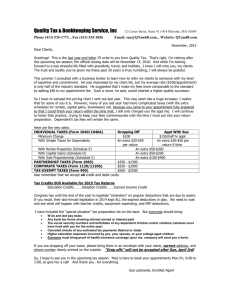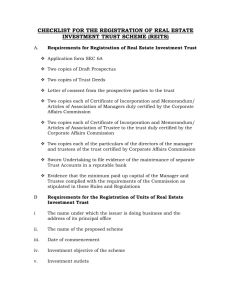
Blurbs for Your Client Newsletter, Blog or Website
Blurbs are categorized as Time Sensitive (related to current events or filing season) or General,
which includes several tax planning topics you may want clients to consider this year.
Please let us know if you find them useful – we’d love to know how they helped your client
communications efforts and if there are specific topics you would like to see covered.
TIME SENSITIVE
The End of the Line for Some Popular Credits and Deductions
Did you know that while many tax rules are permanent, others are written to expire at some point
in the future? These expiring items are often granted a temporary extension, but a significant
number of popular “extenders” terminated at the end of 2013, including both credits and
deductions. A number of credits for qualified energy home improvements and appliance
purchases will no longer be available, along with the credit against health insurance premiums
previously granted to certain taxpayers. Teachers will no longer be able to take the $250
deduction for out of pocket classroom supply purchases, and the deduction for qualified tuition
and related expenses is set to disappear.
How will the end of these and other credits or deductions affect you? And what other tax law
changes could have an impact on your finances? Contact our office to find out the answers. We
can offer the advice and planning recommendations you need to minimize your tax bite and
enhance your overall financial situation.
How Will the End of Some Popular Credits and Deductions Affect Your Business?
Did you know that bonus 50% first-year depreciation will no longer be available to your business
in 2014 and beyond? And that the Section 179 expensing limit, which allows you to deduct
qualified costs immediately instead of expensing them over time, will tumble to $25,000 from
$500,000, where it’s been for the last four years? These are just a few of the changes that
businesses should prepare for this year. While many tax rules are permanent, others are written
to expire at some point in the future. Some are extended and given new deadlines, but a
significant number of popular “extenders” terminated at the end of 2013, including both business
credits and deductions.
How will the end of these and other credits or deductions affect you? And what other tax law
changes could have an impact on your company finances? Contact our office to find out the
© 2014 American Institute of Certified Public Accountants. All rights reserved.
answers. We can offer the advice and planning recommendations you need to minimize your tax
bill and enhance your business’s financial situation.
Will You Pay Higher Taxes on this Year’s Return?
Recent tax laws have increased the highest income tax rate for individuals, raised the dividend
income and long-term capital gains tax rates for wealthier taxpayers and made planning for the
alternative minimum tax a little more complicated for some people. At the same time, those who
run their own shops also had to pay a higher self-employment tax beginning in 2013. And those
are just a few of the changes that could hike the amount you will owe to Uncle Sam with this
year’s tax return. If you find yourself facing a bigger tax bill, we can help. There are many
strategies that can minimize your tax outlay and enhance your overall financial situation. Contact
us for the kind of personalized, expert advice that will help put you on a sound financial footing.
Did You Hire a Veteran Prior to Jan. 1, 2014?
The Work Opportunity Tax Credit offers employers a tax credit for hiring members of certain
groups, including many veterans and those who have received vocational rehabilitation. The
maximum credit can be as high as $9,600, depending on the employee, but it only applies to
hires who begin work before January 1, 2014.
Tax credits are a dollar-for-dollar reduction in your tax bill, so they are well worth taking
advantage of. Your company may be eligible for many credits or deductions that can lower your
tax outlay. Are you making the most of all of them? Contact us today to discuss the best ways to
minimize what you’re paying.
Take the Uncertainty Out of Health Care Reform
If you’re not sure what the new health care law means to you, you’re not alone. A poll by the
Kaiser Family Foundation revealed that just over a third of the public had tried to find out more
information about the law—the Affordable Care Act—in recent months. About half of the
respondents to the survey said they remain confused about the law and its provisions.
If you have questions we can provide the answers you need. Among other things, our individual
clients should be aware of the Shared Responsibility Provision that becomes effective on January
1, 2014. Under the provision, people of all ages, including children, must either have minimum
essential health coverage, qualify for an exemption or make a payment when they file their tax
return. We can help you understand whether your coverage meets the law’s requirements, how
gaps in coverage will be treated and what circumstances qualify for an exemption. Contact us
today to find out how the health care law will affect you.
© 2014 American Institute of Certified Public Accountants. All rights reserved.
Do You Qualify for the Health Care Premium Tax Credit?
Beginning next year, individuals and families can buy private health insurance through
Affordable Insurance Exchanges, which are marketplaces where individuals can find private
health insurance. (This is a new program created by the Affordable Care Act.) If you purchase
health insurance through an exchange, you may be eligible for a tax credit that will make your
coverage more affordable.
The credit is aimed at middle-income individuals and families. A larger credit is available for
older individuals whose coverage costs may be higher. The credit will be refundable, which
means it can be used by people who pay little or no federal income tax. You can arrange for the
credit to be paid to your insurer in advance so that you have little or no out-of-pocket costs. Are
you eligible for the credit? We can help you find out and work with you to make the best use of
your health insurance dollars. Call us today with all your questions about health care finance or
any other financial concerns.
DOMA Decision’s Impact on Financial Planning for Same-Sex Couples
If you are a member of a married same-sex couple, then the U.S. Supreme Court’s decision to
strike down the Defense of Marriage Act could have a substantial effect on many aspects of your
financial life. You may want to consider, for example, filing an amended income tax return if
you now qualify for deductions or credits available to married couples under federal law. Since
same-sex couples are now eligible for the estate tax exemption available to surviving spouses, it
may also be time to review your estate planning.
Those are just a few of the changes affecting qualifying same-sex couples. If you have questions
about the decision’s impact and what it means to your financial situation, be sure to contact us
today.
GENERAL
Seeking a Job? You May Be Able to Deduct the Expenses
Did you know that if you are trying to find work in your current occupation, the costs of your
search, including expenses for preparing and sending resumes, employment agency fees and
© 2014 American Institute of Certified Public Accountants. All rights reserved.
related travel expenses, should be deductible?
The deductions aren’t available in all cases. For example, you’re not eligible to use them if you
are seeking employment in a new field or if this will be your first job. If it’s been a long time
since you left your last job, your costs also may not qualify. Don’t try to navigate the rules on
your own. If you want to learn more about these deductions, or ask any questions about your tax
situation, contact us today.
Smart Disaster Planning Steps
Too often natural disasters strike and serve as reminders that it’s important for both individuals
and businesses to protect themselves against the potential financial consequences of such events.
A few smart steps we recommend include making electronic backups of important records,
including your insurance policies, tax returns, bank and credit card account information, and vital
records. It is critical that you store this backup in a separate location that will be easy to access if
your area suffers damage. You should also take the time to take pictures or videos of your home
or business and store them separately in case you need to make an insurance claim.
If you run a business, you must consider how you will get up and running again after a disaster.
It’s a good idea to develop contingency plans that will enable employees to work from home or
elsewhere if your location is damaged or inaccessible. Both businesses and families should
consider using phone trees or other methods to maintain contact in an emergency. Review your
contact and contingency plans every year to be sure they are up to date.
Want further advice on protecting your family’s or business’s financial well-being in case of a
disaster? We can help. Contact us today with all your financial questions.
A Simplified Home Office Deduction
Do you work at home or have a home-based business? If so, you should be aware that the IRS
has created a simpler option for calculating the deduction for the business use of your home. The
new option makes recordkeeping easier because, instead of maintaining records of specific home
office expenses, you can use a standard rate per square foot. The rate is $5 per square foot (up to
a maximum of 300 sq. feet or $1,500) for qualifying business use space in place of taking a pro
rata percentage of items such as mortgage interest, taxes and repairs.
Keep in mind there are good and bad aspects to this “simpler” method. The new method gives
you back your full interest and tax deduction on schedule A, but you will lose your depreciation
© 2014 American Institute of Certified Public Accountants. All rights reserved.
and loss carryover deductions. Of course, you must still use your home office regularly and
exclusively for business. This may be a welcome relief for some taxpayers, but it might not be
the best choice for others. Is it the right choice for you? Please contact us for answers to all your
financial questions.
Student Loan Debt: We Can Provide the Decision-Making Details You Need
Did you know that the average student loan balance is $24,803? Student debt is taking a heavy
toll on borrowers, according to an American Institute of CPAs survey, which found that 75% of
respondents or their children had made personal or financial sacrifices because of monthly
student loan payments. Sacrifices included putting off saving for retirement (41%); delaying car
purchases (40%); postponing a home purchase (29%); and even waiting on marriage (15%).
Among the most troubling findings were that only 39% fully understood the burden that student
loan debt would place on their future and 60% had at least some regrets about their decisions on
financing their education. That’s why it’s always critical to understand the full potential impact
of all your financial choices. The good news is that your CPA can help. Contact us with all your
financial questions and we’ll provide the knowledge and insights you need to make the best
decisions for you.
Stop Tax Identity Theft in Its Tracks
Imagine after sending in your annual tax return, you receive a notice from the Internal Revenue
Service saying that another return has already been filed using your name and Social Security
number—and claiming a refund. Sound impossible? It can happen if you become one of a
growing number of victims of tax return identity theft. According to one estimate, tax-related
identity theft cases have soared more than 650% since 2008. At the least, this crime can lead to a
delay in your refund, but the consequences may be much more serious. In addition, you may face
a larger problem with identify theft if the scammer is also running up credit card debt or taking
out loans in your name.
To avoid becoming a victim, we recommend steps such as safeguarding your Social Security
number and other financial information, keeping an eye on changes to your credit ratings and
taking precautions with electronic transfers of confidential information. Be sure to contact us if
you believe you have been a victim of identity theft or would like advice on the best ways to
secure your financial information.
© 2014 American Institute of Certified Public Accountants. All rights reserved.
What You Should Know about Changes in Education Provisions in the Tax Law
Are you making the most of tax benefits designed to offset some of the high costs of education?
The American Taxpayer Relief Act of 2012, which settled the year-end fiscal cliff debate,
extended the American Opportunity Tax Credit through 2017.The credit provides a tax break of
up $2,500 for qualified college expenses. The Act also made permanent several education-related
tax options, including a $2,000 maximum contribution amount for Coverdell education savings
accounts, which can be used to pay certain elementary, secondary and post-secondary expenses.
Given the many changes, we can help you make sense of the benefits available to you and ensure
you’re taking full advantage of them. We can also offer advice on smart steps for financing the
high cost of education, so please contact our office with all your questions.
Does the Investment Income Tax Apply to You?
As of Jan. 1, 2013, there is a 3.8% net investment income tax on some categories of passive
investment income for individuals, trusts and estates that exceed certain income thresholds. As a
result, it is in your best interest to identify these income sources and adopt strategies to lower
your modified adjusted gross income or your net investment income to avoid the surtax.
If you think the new tax may apply to you, we can explain your choices and help you pick the
best strategy to mitigate your tax bill.
How Do New Estate Tax Rules Affect You?
You may have heard that there are new rules on estate taxes as a result of the new tax law
enacted in early 2013. Effective Jan. 1, 2013, the top tax rate on estates rose to 40% from 35%,
but no tax will be imposed on the first $5.25 million of an estate (adjusted for inflation to
$5.34M million in 2014). While this sounds high, and you may think that the estate tax doesn’t
affect you or your family, you may be surprised. Estate planning should definitely be a priority.
Contact us now to discuss all your questions about estate planning and the steps you can take to
minimize the potential estate tax burden to your beneficiaries.
Is a Like-Kind Exchange a Good Option for Your Business?
Normally, when companies sell properties, they must pay taxes on any gain they receive. Like© 2014 American Institute of Certified Public Accountants. All rights reserved.
kind exchanges, transactions in which companies trade properties, may be carried out without
any immediate tax consequences.
They must satisfy IRS rules, however, which include:
The properties must have the same “nature or character,” as set forth in IRS
guidance.
The exchanges can be business or investment properties put to a productive use.
The exchanges can’t involve inventory, most securities and some other assets.
Taxes must be paid on any cash or non-similar property that is part of the deal.
Keep in mind that like-kind exchanges are tax-deferred transactions, not tax free. When a
company eventually sells the property it received in an exchange, it must pay tax on any
gain from its original investment. In the meantime, though, the business/company can use
the funds it would have paid in taxes and it has acquired a new property that may better
suit its needs without necessarily making a cash outlay.
Want more information about whether like-kind exchanges can be a good strategy for your
business and insights on their tax impact? We can help. Contact us today for expert advice on
the best ways to address your business and tax concerns.
Is Your Will Up To Date?
When was the last time you reviewed your will? People generally make wills to guarantee the
proper disposition of their money and property, which is why it’s a good idea to consult your
CPA when it’s time to create or update your will.
We recommend that you revisit your will every time you experience a major life event, such as
marriage, the birth of a child, retirement or other significant milestones. Even if there is no
meaningful change in your life, it’s smart to review the document every couple of years to
ensure it still addresses all your estate concerns and reflects your wishes. Changes in the value
of your investments—such as a stock portfolio or real estate—may also require adjustments in
your estate plans.
Reviewing your will may raise questions about various areas of your financial life,
including your retirement or estate planning, college savings or other financial concerns. Be
sure to turn to us for the perspective and advice you need to make the best choices.
© 2014 American Institute of Certified Public Accountants. All rights reserved.
Let Us Help You Leverage What You Can Learn from Your Tax Return
What does your tax return say about your financial situation? The fact is, the paperwork you file
each year offers excellent information about how you are managing your money—and about
areas where it might be wise to make changes in your financial habits. If you have questions
about your financial situation, remember that we can help. Our firm is made up of highly
qualified and educated professionals who work with clients like you all year long, serving as
trusted business advisors.
So whether you are concerned about budgeting; saving for college, retirement or another goal;
understanding your investments; cutting your tax bite; starting a business; or managing your
debt, you can turn to us for objective answers to all your tax and financial questions.
How Do Taxes Affect Your Financial Picture?
Do you know how much you’re paying in taxes? You may have a sense of what you spend on
income taxes, but have you also considered the taxes you pay on utilities, gasoline, cigarettes and
alcohol, hotel stays and numerous other items? The CPA profession’s Total Tax Insights™
calculator (www.totaltaxinsights.org) can put these numbers in perspective, enabling you to
make better informed financial decisions.
Take a few minutes to drop in your numbers, and if your results raise questions about your
financial planning choices, we can help. If you’d like to get started, don’t hesitate to contact us
with all your questions.
We Can Help You Address the Issues that Keep You Up at Night
Where will your business be in five years? Would strategic budget cuts in some areas improve
your company’s health? Are there ways you can boost revenue? If you’re nearing retirement, is
there a buyer or successor in the wings? These are the kinds of questions that keep many
business owners up at night. Fortunately, as your CPA, we can probably help you sleep a little
easier. Our firm is made up of highly qualified and educated professionals who work with
clients like you all year long, serving as trusted business advisers. We act as coaches, guides
and trainers for our business clients, helping them chart the best route to success. So be sure to
turn to us with all your business questions or concerns.
© 2014 American Institute of Certified Public Accountants. All rights reserved.
What’s So Great about CPAs?
You may not have asked yourself that question in so many words, but you may have wondered
what sets CPAs apart from other financial professionals. The answer in short: A lot. We
typically begin our careers with years of college and graduate education. To become licensed,
we must take the demanding Uniform CPA Examination, which tests our knowledge on a wide
range of business topics over a total period of 14 hours. In addition, we have to meet an
experience requirement and then be licensed by a State Board of Accountancy to practice. But it
doesn’t stop there. Once we become CPAs, we also must meet continuing education
requirements to update our knowledge of new business developments as well as commit to a
strict code of ethical standards. Armed with this rigorous training, we’re on the job year round,
ready to help individuals and businesses address their own unique challenges.
If you want more information about our firm and how we can help you resolve all your financial
issues, don’t hesitate to contact us.
Have Questions? We’re Here All Year!
Many clients see their CPAs at tax time, when the main focus is on completing and filing
their tax return. As a result, they may not take the opportunity to ask questions about longterm tax planning or about other important financial concerns. The good news is that we are
available to you all year. We have a full- time, year-round staff of experts with extensive
expertise in a broad range of financial areas. We’re ready when you are to take some time
reviewing your financial situation, helping you understand your options and make the best
decisions. We’re also here in an emergency to help address unexpected financial concerns.
So, give us a call to discuss your important financial issues whenever they arise.
© 2014 American Institute of Certified Public Accountants. All rights reserved.







